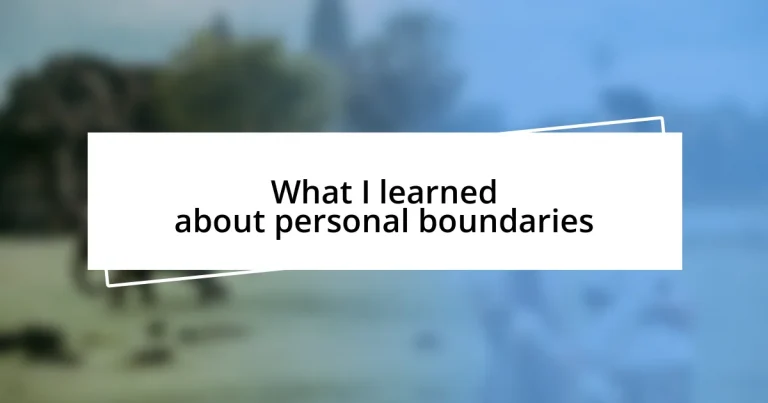Key takeaways:
- Personal boundaries protect emotional well-being and enhance relationships by promoting clarity and mutual respect.
- Recognizing and communicating boundary violations is crucial for maintaining healthy interactions and fostering understanding.
- Practicing boundary-setting techniques, such as self-reflection and concise communication, empowers individuals to assert their needs effectively.
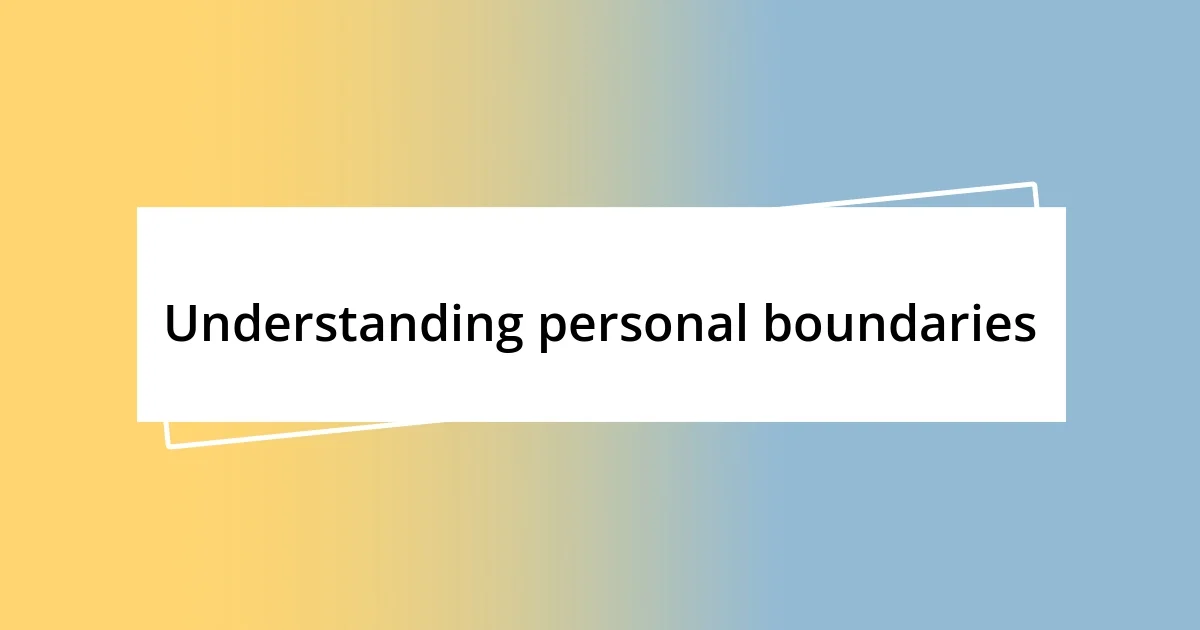
Understanding personal boundaries
Personal boundaries are fascinating because they define how we interact with the world and protect our emotional wellbeing. I remember a time when I felt overwhelmed by a friend’s constant demands for help. It made me wonder, why didn’t I just say no? Understanding that my limits were being tested opened my eyes to the importance of having clear boundaries, both for myself and others.
I once mistakenly thought boundaries were about building walls, but they are really about creating safe spaces for connection. When I started communicating my needs more openly, like telling my coworker when I needed uninterrupted work time, I felt a weight lift off my shoulders. Isn’t it liberating to realize that expressing our limits can lead to more fulfilling relationships, rather than pushing people away?
Exploring personal boundaries encourages us to confront our feelings and identify what truly matters to us. Have you ever felt drained after a social gathering? For me, it used to come from not expressing my need for quiet time. Reflecting on those instances taught me that recognizing and asserting my boundaries not only nurtures my energy but also makes my interactions more authentic.
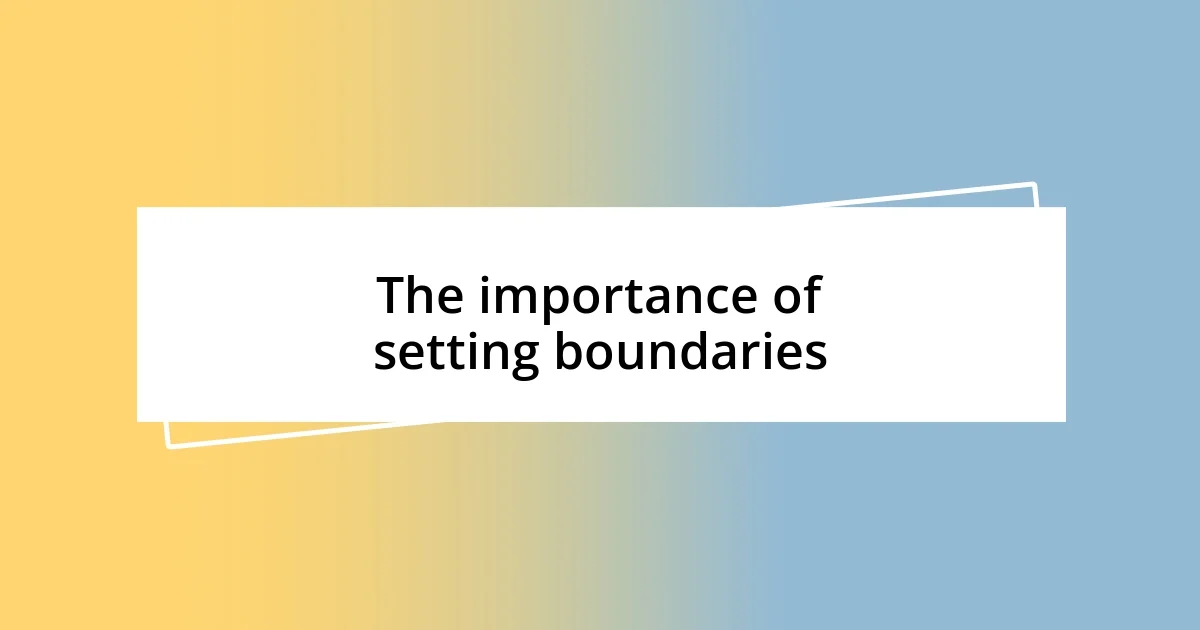
The importance of setting boundaries
Setting boundaries is essential for maintaining healthy relationships and personal well-being. I’ve often found that when I neglect my limits, feelings of resentment and stress start to creep in. It’s a little like ignoring that warning light on your car dashboard; if you don’t address it, something more significant might go wrong down the line.
Moreover, setting clear boundaries helps clarify what is acceptable for us in various relationships. I recall a situation where I was overwhelmed by family obligations. By gently expressing my limitations, I noticed my family became more understanding and supportive. It was a revelation: boundaries didn’t isolate us; instead, they fostered a deeper respect and connection.
The importance of boundaries cannot be overstated. They act as a guide, keeping our emotions and mental health in check. I’ve seen firsthand how having established limits allows for more genuine exchanges. When I finally took the time to articulate my needs during a difficult conversation with a friend, it transformed our relationship. Don’t you think it’s incredible how establishing boundaries can lead to such profound changes?
| Boundaries | Impact |
|---|---|
| Without Boundaries | With Boundaries |
| Feelings of overwhelm | Clarity in relationships |
| Resentment towards others | Mutual respect and understanding |
| Decreased mental health | Improved emotional well-being |
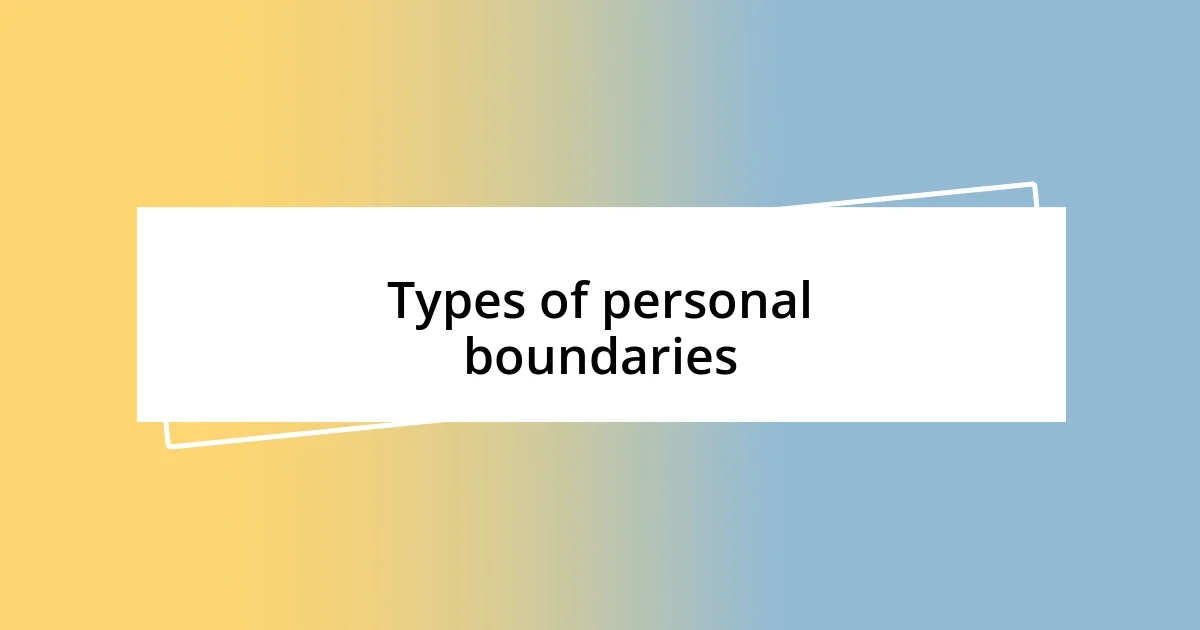
Types of personal boundaries
Understanding the different types of personal boundaries can be a game-changer in how we interact with others. I’ve found that recognizing these boundaries brings clarity to many situations in my life. For instance, privacy boundaries can often be overlooked, yet I learned their significance when a friend posted a private moment from my life on social media without asking. It felt like a breach of trust that pushed me to express my need for privacy more firmly going forward.
Here’s a breakdown of the types of personal boundaries I’ve encountered:
- Physical boundaries: Relate to personal space and physical touch. Understanding my comfort level saved me from uncomfortable situations.
- Emotional boundaries: Help protect our feelings. Establishing these boundaries means recognizing when baggage from others is weighing me down.
- Time boundaries: Are about how we manage our time with others. When I started saying “no” to unnecessary commitments, my free time became a treasured commodity.
- Material boundaries: Involves how we share our possessions. I once loaned a book to someone who never returned it, which led me to set clearer limits around lending my things.
- Intellectual boundaries: Protect our thoughts and ideas. I became more assertive when sharing my opinions, realizing that my contributions are valid and deserve respect.
Identifying these boundaries helps me clarify my needs and the dynamics in my relationships. The more I understand these boundaries, the better equipped I feel to communicate them effectively, fostering healthier connections in the process.
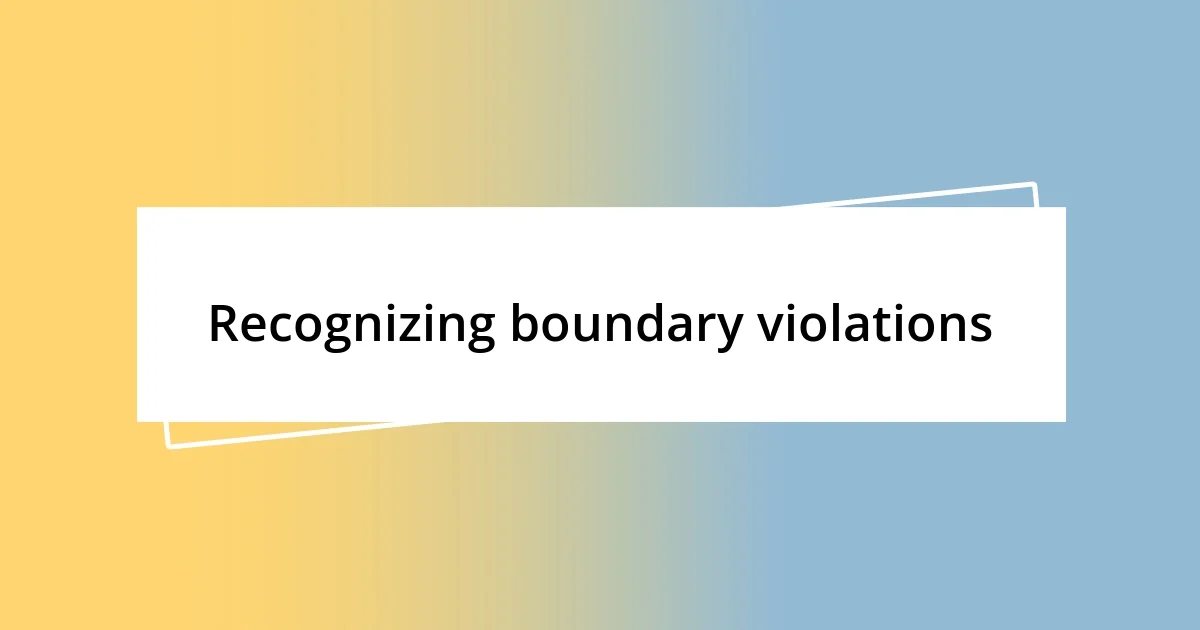
Recognizing boundary violations
Recognizing boundary violations can often feel like an emotional alarm ringing in your gut. I remember a time at work when a colleague constantly interrupted me during meetings. It wasn’t just annoying; it made me question my own value. Have you ever felt that sinking feeling when your space is invaded? It’s a sign that your boundaries are being crossed, prompting you to take action.
In hindsight, I realize that boundary violations can sometimes be subtle, disguised as casual comments or misplaced jokes. A friend once joked about my appearance in a way that made me uncomfortable, blurring the line between humor and disrespect. That moment sparked a realization for me: even light-hearted banter should respect personal limits. Have you been in a similar situation where a joke felt less like laughter and more like a slight? It’s essential to gauge your feelings; they often signal where your boundaries lie.
Responding to these violations is crucial for maintaining your well-being. I’ve learned that the longer I remain silent, the more frustration builds up inside me. I eventually confronted that colleague about their interruptions, and surprisingly, they hadn’t realized how their behavior affected me. Isn’t it interesting how our voices can reshape our interactions? Establishing boundaries can turn discomfort into understanding, empowering us to reclaim our space and foster better communication.
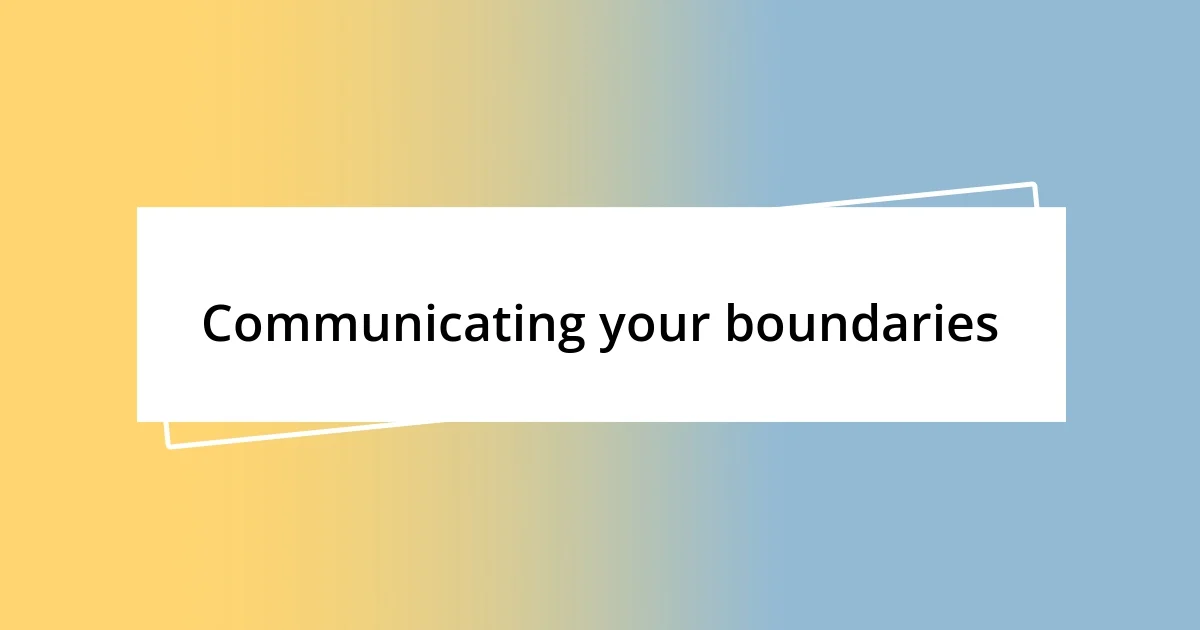
Communicating your boundaries
Communicating boundaries can feel daunting, especially if you’re not used to voicing your needs. I remember a moment when a close friend repeatedly borrowed my things without asking. Instead of letting it slide, I found the courage to sit down and explain how much it bothered me. Surprisingly, my friend appreciated my honesty, and our relationship became stronger for it.
I’ve discovered that clarity is key when conveying your boundaries. For instance, during a group project, I realized I needed to speak up about my preferred working hours. I calmly expressed my limitations, and to my relief, the team was accommodating. Have you ever felt that your availability was taken for granted? I learned that simply stating my needs led to greater respect within the group.
It’s also important to be direct but gentle when articulating your limits. Once, I had to tell a family member that certain topics were off-limits during gatherings. I approached it with empathy, acknowledging their intentions while being clear about my discomfort. It was a pivotal moment in setting my emotional boundaries, and it felt liberating. Think about how you can frame your needs positively—what small changes could lead to a more respectful dialogue in your relationships?
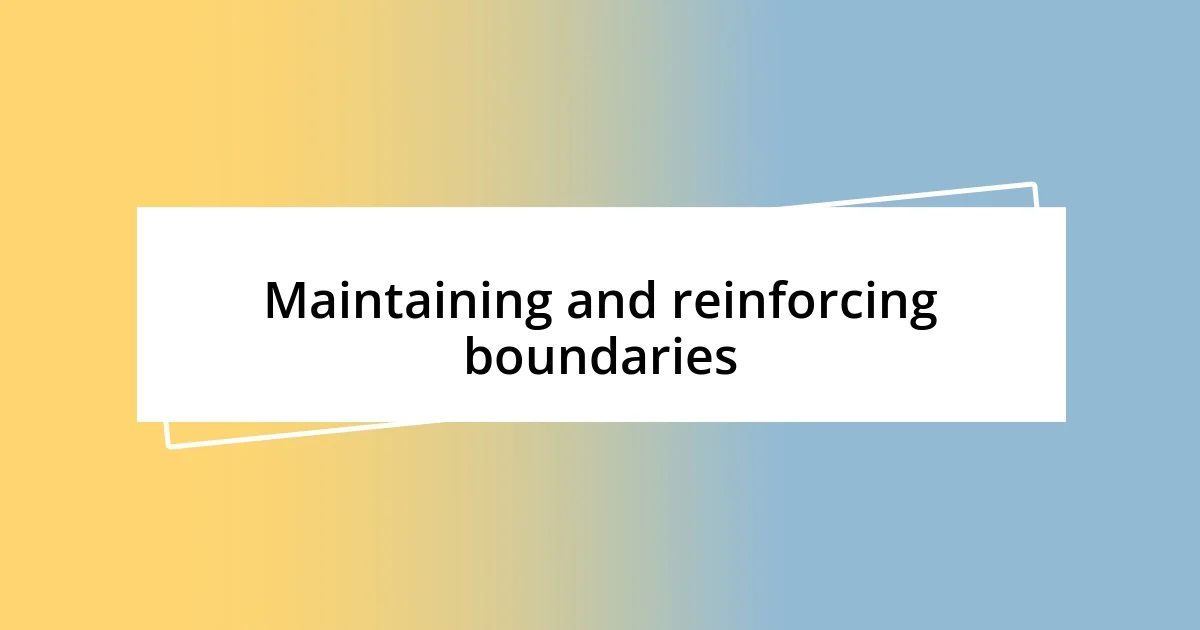
Maintaining and reinforcing boundaries
Maintaining boundaries requires ongoing effort and self-awareness. I once found myself in a situation where I allowed my personal boundaries to slip after a close friend began frequently dropping by unannounced. The first few visits felt okay, but soon it began to overwhelm me. Have you ever felt that moment where the novelty of a situation shifts into discomfort? I learned that reinforcing my boundaries meant kindly reminding my friend that I needed time to myself.
It’s essential to recognize that people may not always realize when they’ve overstepped. After my initial conversation with that friend, I noticed they still occasionally forgot. I decided to gently bring it up again, explaining how much I treasured our time together but also valued my alone time. It sparked a deeper discussion about mutual respect in our friendship. Have you experienced a similar cycle in your relationships where repeating a boundary enforced a positive change?
Sometimes, I’ve discovered it helps to physically recharge before addressing boundary issues. After a particularly draining week, I felt overwhelmed by external demands. Taking a walk to center my thoughts and emotions gave me the clarity needed to communicate my limits effectively. Isn’t it amazing how stepping back can clarify what truly matters? By regularly checking in with myself, I can adjust my boundaries and reinforce them with the grace and strength I’ve cultivated along the way.
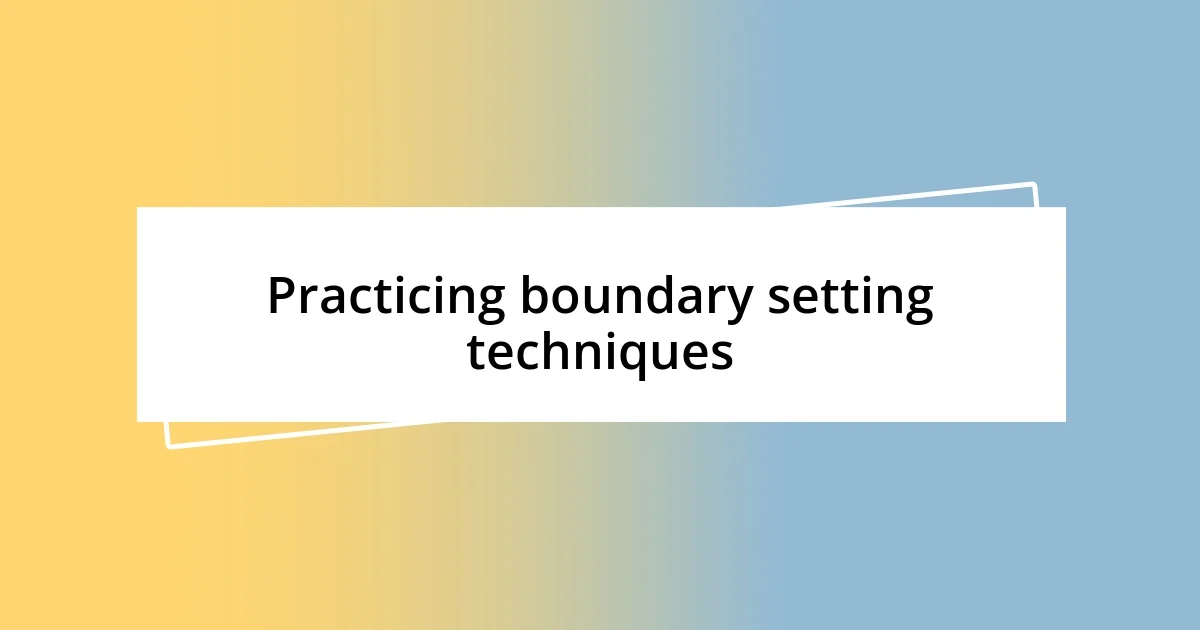
Practicing boundary setting techniques
I’ve found that practicing boundary-setting techniques often starts with self-reflection. For instance, I took time to journal about situations that made me uncomfortable, which illuminated areas where my boundaries were weak. It was eye-opening; have you ever realized patterns in your life that were costing you your peace? Recognizing these moments is the first step in effectively communicating what you need.
Role-playing boundary conversations has also been a game-changer for me. I once enlisted the help of a trusted friend to simulate a tricky conversation with a colleague who frequently overstepped. The mock exchange allowed me to articulate my feelings and rehearse my message, ultimately reducing my anxiety when the real conversation came around. Have you tried any strategies to prepare for tough discussions? I found that doing this made me feel much more confident and clear on my intentions.
Another technique I’ve embraced is setting clear and concise statements to convey my needs quickly. I remember telling a neighbor, “I can’t talk right now, but let’s catch up later,” instead of getting entangled in a longer explanation. Brevity can be powerful! This approach not only honored my time but also kept the dialogue open for future interactions. What’s a simple phrase you could use to set your boundaries without guilt? Finding your own unique way to express limits can relieve the pressure to say more than necessary while still being respectful.












